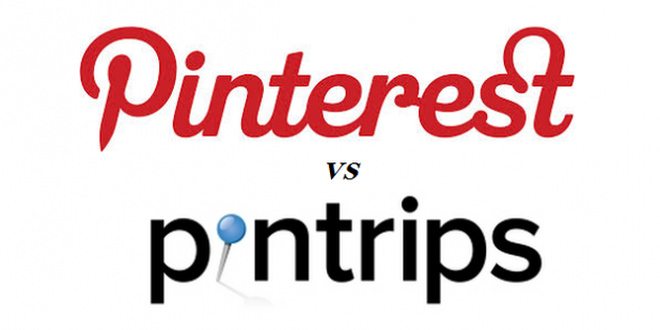

AOL once sought trademark rights in “You’ve Got Mail,” but could not because AOL, like other email services, would use the phrase to inform users they had received new emails – it was not used as a trademark. Because the phrase was used to convey meaning, it was held generic and not protectable as a trademark.
12 years after the AOL case, another Internet heavyweight, Pinterest, claims, among other things, trademark rights in a term, that it uses generically, and seeks to exclude other social media startups from using the term, “PIN.”
Has “Pinterest” Become Generic?

Pinterest’s Pin It Button.
PINTEREST, proper, probably has not become generic. But it is unclear whether they possess legitimate trademark rights in terms such as PIN IT, which Pinterest displays as a button hovering over images. When grouped together, these images form inspirational boards.
Six “Pin” Mark-Holders Gave-In to Pinterest Pressure
So far, Pinterest has had a perfect track record of deterring companies from gaining federal trademark rights in brands incorporating the PIN prefix. After Pinterest opposed 6 trademark registrations, all these end up withdrawn or abandoned by their fleeting owners. A clear win for Pinterest, which, in its streak, also recovered more than 100 domain names from a Chinese cybersquatter who had the unfortunate habit of registering variations of the pinterest domain name.
Pintrips’ Resiliency
Recently, however, Pinterest encountered less success in implementing the same tactic. A new PIN contender, Pintrips, a startup that simplifies the process of comparing flight prices online, has not been intimidated into a settlement and seems determined to fight tooth and nail with Internet’s third most popular website. Discovering Pintrips’ unusual resiliency, Pinterest filed a trademark infringement suit, alleging pretty much everything but the kitchen sink. In my opinion, their decision to go for a full-fledged suit, instead of going the usual and economical trademark opposition route, is a way to further push Pintrips toward settling.
Unflinching, Pintrips seems to be gearing up for battle.
 Pinterest’s Mistakes
Pinterest’s Mistakes
Although the similarity in sight and sound are obvious, Pintrips is no fool. And even if risky, their strategy may pay off.
Pinterest has made, and continues to make, many trademark blunders. To this day, Pinterest fails to use the mark in a trademark fashion. Indeed, the first three letters of their mark – PIN – is used to refer to features, instead of using their mark to indicate exclusively the source of their services. In short, Pinterest uses variation of the word PIN (a) “functionally” by using the common meaning for the PIN term and by (b) using that term as so much more than just a source-identifier.
(a) “PIN” and “PIN IT” Used Functionally

On terra firma, a pin is “a thin piece of metal or wood, used especially to hold things together;” online, Pinterest uses it to mean just that. Of course, Pinterest’s PIN IT is an online button – not an actual pin – but that is a distinction without a difference. Pinterest’s PIN IT button is its own version of a Facebook “Like,” except that on Pinterest you can easily retrieve your pins by grouping them together in different thematic boards.
Pinterest uses Pin in a context that suggest its ordinary meaning. Thus, Pinterest has no right to exclude others from doing the same. With the AOL decision as ammunition, Pintrips is on solid ground to make a generic use argument.
The AOL decision.
In 2001, while online social media was still a vague idea, AOL, sought to exclude others from using a specific phrase, “You’ve Got Mail.” AOL was probably pretty optimistic about its prospects. After all, that robotic upbeat voice is, to this day, burned in our memories.
Nonetheless, the court noted that “AOL’s use of the phrase, conditioned on whether mail is present, does not describe AOL’s e-mail service, but rather simply informs subscribers, employing common words to express their commonly used meaning, of the ordinary fact that they have new electronic mail in their mailboxes.” And went on to hold that “when words are used in a context that suggests only their common meaning, they are generic and may not be appropriated as exclusive property.”
This language clearly favors Pintrips.
(b) PIN Used As A Noun & A Verb, Not An Adjective
To preserve its trademark power, a startup should not use its mark (or a portion of it) as a noun or a verb, but only as an adjective. The reason is that by using a mark in other ways than as a mark, its propensity to be associated with a company deteriorates and, pretty soon, the mark becomes the catch-all term for the feature or the category. ASPIRIN, THERMOS, ESCALATOR, YELLOW PAGES and TRAMPOLINE were once illustrious brands and protectable trademarks until they each became generic. For most of these, the loss was brought onto themselves, because of improper use of their own trademarks.
Pinterest should have stressed the trademark significance of the “PIN” term. Instead, it did just the opposite, utilizing the PIN term all over. This kind of trademark blunder has often tipped the balance toward finding a mark generic.
Is Pintrips Biting More Than It Can Chew?
Although Pintrips has powerful ammunitions at its disposal, a legal win is a long road ahead. Before that happens, Pintrips will have to incur significant legal expenses, in the form of survey of evidence, to demonstrate genericness. Such costly evidence may be the only way to prevail because Pinterest’s trademark registrations unlock favorable presumptions. And, arguing against a registered trademarks tend to create factual disputes, which means that Pintrips is unlikely to get an early win, but would have to go through the expenses of a lengthy trial.
To make matter worse, Pintrips is, somewhat, shooting itself in the foot by arguing genericness. A Pintrips success would mean that its own PIN-based trademark would be in jeopardy. A success would also open the competitive floodgate. Indeed, if PIN is generic, any other social media startups can use it. Nothing attracts “Me Too” startups like a judicially sanctioned invitation to utilize a popular term, such as PIN.
Points To Ponder
Pintrips may be in a weaker posture than AT&T, the defendant, in the AOL case. And, importantly, because it is a young startup, probably still in the red, it may not have the war chest needed to live to see a victory. Nevertheless, with more and more frequency, we see startups treating suits as an expected cost, a by-product of disrupting industries. Aereo, Uber and Pandora are just some examples of startups successfully building such legal costs into their business models. If Pintrips does not run out of steams, it may just be the next successful disruptor on the list.



